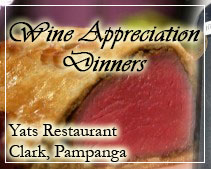Mercado: No, Thank You
March 23, 2011
JAPANESE government officials are not enthusiastic, much less delighted, over our token of symbolic offer of assistance in their quake-ravaged condition. Their people prefer to suffer in dignity and prove they are a superior race.
Known for their polite nature, the said officials just could not say, ŌĆ£No, thanksŌĆØ to our proffered assistance but coached their adverse reaction by setting a daunting condition.
Any proposed Philippine contingent sent to the quake-tsunami devastated country must be ŌĆ£self-sufficient.ŌĆØ That was the terse and unmistakable message the Japanese government conveyed to our eager-beaver officials who volunteered rescue-relief services.
The conditional caveat of self-sufficient volunteers is an indirect way of saying that our team will just pose if not add burden to the recipients by way of feeding, supplying and maintaining their operation.
This is a subtle although unintended indictment of our capability to carry out independent assistance operation in a foreign setting without being a bother to the host country.
Having occupied the Philippines during the last war, the Japanese had studied quite well the Filipino culture, including its traditions and practices in community work, disaster response and aspects of volunteerism.
As well known for his hospitality and love for fun, the Filipino is remarkable for sacrificing his time and labor for a good cause. ThatŌĆÖs the core of our famous ŌĆ£bayanihanŌĆØ spirit, best exemplified by able-bodied men in a village who donate free labor to build a nipa hut, or transport it, for love of neighbor.
The cause of brotherhood, however, has to be maintained by a full stomach. Enthusiasm is not sustained by hunger pangs but is kept energized by modest nourishment.
That is the Filipino way ŌĆō the family being assisted has the obligation to feed those who volunteered their time and skills for any purpose.
That makes planting rice in another farmerŌĆÖs field an enjoyable volunteer effort among farmer folks, provided, of course, free labor is kept away from hunger pangs. This practice is visible as well in the conduct of Block Rosary crusades with their inevitable merienda.
Our barangay tanod who make nightly ŌĆ£rondaŌĆØ in the locality are served free coffee and biscuits by the larger sari-sari stores and night establishments in their area.
The village security force (Tanod) is most visible during barrio fiestas; in the Pabasa with its ŌĆ£puniŌĆØ, in basketball tournaments, and public events. Custom dictates that the Tanod and their auxiliaries are fed well, not only as token gratitude of the organizers, but especially to increase their efficiency and vigilance.
Even volunteers in a political campaign are kept productive and aggressive if they are fed well. The scientist Einstein advices, ŌĆ£an empty stomach is not a good political adviser.ŌĆØ From this wisdom evolved public servants who are motivated by ŌĆ£leyes en estomago.ŌĆØ
Knowing our more outstanding civic virtues and habits, the Japanese officials who would not accept outright our offer of rescue assistance in any form are apprehensive that the Filipino group that may come to their country may pose added problem to the host country. Comfortable accommodation, hospitable work conditions, and a well-stocked larder are not expected by the volunteers but surely are welcomed during their mission.
Of course our contingent, well-instructed and disciplined to hard work and difficult conditions, will not demand the usual amenities while in a ravaged environ. Ramen and sashimi will be good enough.
Aside from apprehensions arising from our distinct tradition, the Japanese are highly aware of the FilipinoŌĆÖs capability ŌĆō and built-in weakness ŌĆō in the face of opportunities.
Fresh in their mind is the case of five Manila police officers who pocketed about Pl2 million of the P16 million kidnap-for-ransom money recovered during a recent police operation.
The Japanese Embassy knows how our fire fighters are known to stash stolen loot while tending a building on fire; how some security guards and some policemen, too, are involved as accomplices in a bank robbery, along with insider-officials of the banks.
Of late, some compatriots, especially those convicted as drug mules, brought notoriety and shame to the Philippines by their bold and reckless involvement in drug trafficking. A congressman (now dropped from the Rolls of Congress) added to this mounting bad image abroad.
Japanese officials have a serious reason for turning down Philippine volunteer-group assistance. Our gesture of support is appreciated but unwelcomed, the goodwill recognized but not demanded.
By suggesting that any PH-work group, to be favorably accepted in their country must be ŌĆ£self-sufficientŌĆØ, Japan has told us to ŌĆ£Back off!ŌĆØ
Japan thinks of itself as a superior nation. Superiority has its own ways and methods.
We should not insist to push unsolicited help nor force an act of friendship on the unwilling.
There is simply that monster of a cultural and economic arrogance as especially epitomized by JapanŌĆÖs refusal to make full compensation and moral rectification in the case of Filipino comfort women. This has remained an unresolved resentment and an old source of mistrust and misunderstanding.
Carlos Romulo said that there can be no real friendship and mutual respect between people when one person feels himself the superior of the other.
Source: http://www.sunstar.com.ph/pampanga/opinion/2011/03/22/mercado-no-thank-you-146270
Poor Philippines Records in Law and Order drove city dwellers to enjoy holidays in havens like Clark Freeport.
Metro Manila has lost a great deal of its luster of old not only because of its failure to keep up with the times in development but also its reputation as a safe destination for family bonding, travelers looking to unwind and relax in a beach or a lake and retirees looking for a life of leisure.
Clark Pampanga was the largest foreign US airbase, complete with its own international airport with daily flights linking it to major cities around Asia. Inside of Clark Philippines are golf courses, casinos, family-styled resorts that smacks of the US suburban lifestyles and fine-dining restaurants.
This web site contains articles and information that will be helpful to visitors, residents and tourists traveling out of town from Manila on a short getaway to Subic, Angeles City, Pampanga and Clark Philippines. There are several web sites that contain information that might also be pertinent to what is happening in North Luzon.
For assistance with organizing and planning weddings and garden receptions, log on to http://www.PhilippinesWeddingVenue.com
For assistance with lodgings, accommodations, hotels and resorts near Manila in Subic, Pampanga, Angels City and Clark Philippines log on to http://www.HotelClarkPhilippines.com
While in Clark, one might as well add to the itinerary a visit to the famous Clark Wine Center, the largest wine shop in Philippines which offers over 2000 selections of fine vintage wine from all wine regions, vintages spanning over 50 years covering all price ranges.
http://www.ClarkWineCenter.com
If this article about Clark is useful to you, please click here to contact us to tell us what more you wish to know about this article or Clark Philippines, which can be something about Clark investment, about Clark resorts, about Clark Swimming and Leisure or simply general news about Clark.
Please send questions to Editor@ClarkPhilippines.com. Leave your name, email address, contact numbers and we will get back to you as soon as possible. Information received will not be disclosed.













